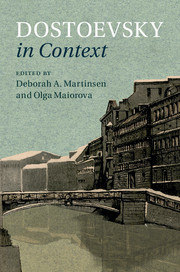Book contents
- Frontmatter
- Contents
- List of illustrations
- Notes on contributors
- Acknowledgments
- Note on citation, transliteration, glossary, and dates
- Chronology
- 1 Introduction: the many worlds of Dostoevsky
- PART I SOCIAL, HISTORICAL, AND CULTURAL CONTEXTS
- PART II LITERATURE, JOURNALISM, AND LANGUAGES
- 25 Modern print culture
- 26 Realism
- 27 Dostoevsky: translator and translated
- 28 Travel and travel writing
- 29 Folklore
- 30 Foreign languages
- 31 Theater
- 32 Dostoevsky's journalism and fiction
- 33 Dostoevsky's journalism in the 1860s
- 34 Dostoevsky's journalism in the 1870s
- 35 Censorship
- Glossary
- Further reading
- Index
- References
32 - Dostoevsky's journalism and fiction
from PART II - LITERATURE, JOURNALISM, AND LANGUAGES
Published online by Cambridge University Press: 18 December 2015
- Frontmatter
- Contents
- List of illustrations
- Notes on contributors
- Acknowledgments
- Note on citation, transliteration, glossary, and dates
- Chronology
- 1 Introduction: the many worlds of Dostoevsky
- PART I SOCIAL, HISTORICAL, AND CULTURAL CONTEXTS
- PART II LITERATURE, JOURNALISM, AND LANGUAGES
- 25 Modern print culture
- 26 Realism
- 27 Dostoevsky: translator and translated
- 28 Travel and travel writing
- 29 Folklore
- 30 Foreign languages
- 31 Theater
- 32 Dostoevsky's journalism and fiction
- 33 Dostoevsky's journalism in the 1860s
- 34 Dostoevsky's journalism in the 1870s
- 35 Censorship
- Glossary
- Further reading
- Index
- References
Summary
Introducing the book Literary Journals in Imperial Russia, Robert Maguire noted “that the rise of the novel […] coincided with the rise of the thick journal” and commented on the need “to study the ways in which these various verbal genres interact and shape each other.” Thick journals* had broad-ranging sections that spoke to “a variety of intellectual, cultural, and literary interests,” and “a more or less discernible ideology”; they were also the basic forum in which all nineteenth-century Russian novels were published serially. Dostoevsky not only wrote fiction that was published in thick journals; he also edited and wrote for a number of them. With his brother Mikhail, he created, edited, and contributed to the thick journal Vremya (Time, 1861–3). After Time was closed by the censors, he opened it under another name, Epokha (Epoch, 1864–5). In the 1870s, he edited and wrote columns for the journal Grazhdanin (The Citizen, 1873–4); and then created his own monthly monojournal, Dnevnik pisatelya (Diary of a Writer, 1876–7; one issue in 1880; one in 1881). This essay will examine perspectives on Dostoevsky's journalism; continuity and lack of continuity in his journalism; fictional reflections of ideas expressed in his journalism; and his journalism's influence on the shape of his fiction.
Perspectives on Dostoevsky's journalism
There are many different ways to approach Dostoevsky's journalism. One can focus on its separate phases. Like Robert Belknap, one can explore Dostoevsky's broad use of materials, including journalism, for the creation of his final novel. Following my example, one can examine the evolution of Dostoevsky's ideas in the 1860s journals and observe some connections to his literary works. Like Vera Nechaeva, Wayne Dowler, and Sarah Hudspith, one can situate his 1860s ideas within the ongoing polemics of the radicals, who advocated a change of political regime, and the Slavophiles*, who envisioned Russia's return to its native institutions. Like Joseph Frank, one can discuss all of Dostoevsky's journalistic and fictional ventures and focus on the importance of feuilletons. Like Kate Holland, one can explore Dostoevsky's 1870s journalism within the context of Russian societal and cultural tendencies of the time. Like Deborah Martinsen, one can look at rhetoric and confession in Diary of a Writer. Like Gary Saul Morson, one can look at the Diary as a separate literary work, that is, journalism as literature, and as linked to The Brothers Karamazov (1879–80).
- Type
- Chapter
- Information
- Dostoevsky in Context , pp. 272 - 279Publisher: Cambridge University PressPrint publication year: 2016



